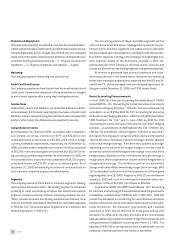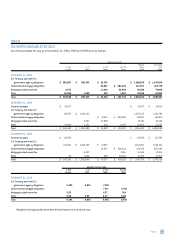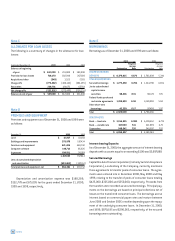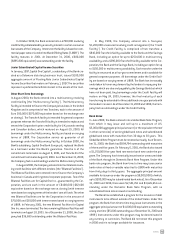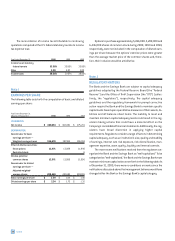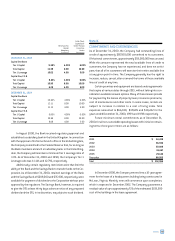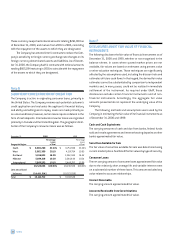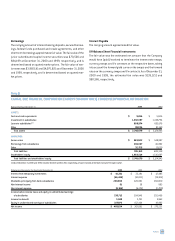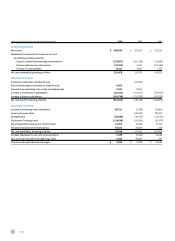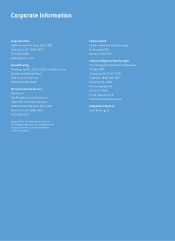Capital One 2000 Annual Report Download - page 62
Download and view the complete annual report
Please find page 62 of the 2000 Capital One annual report below. You can navigate through the pages in the report by either clicking on the pages listed below, or by using the keyword search tool below to find specific information within the annual report.
In 1999, the Company entered into two three-year agree-
ments for the lease of four facilities located in Tampa, Florida and
Federal Way, Washington. Monthly rent commences upon com-
pletion of each of the buildings. At December 31, 2000, the
construction of two of the facilities has been completed and rent
payments have commenced. The Company has a one year renewal
option under the terms of the leases. The Company guarantees a
residual value to the lessor of up to approximately 85% of the cost
of the buildings in the lease agreement.
In 1998, the Company entered into a five-year lease of five
facilities in Tampa, Florida and Richmond, Virginia. The Company has
two one-year renewal options under the terms of the lease. If, at the
end of the lease term, the Company does not purchase all of the
properties, the Company guarantees a residual value to the lessor
of up to approximately 84% of the costs of the buildings.
In connection with the transfer of substantially all of Signet
Bank’s credit card business to the Bank in November 1994, the
Company and the Bank agreed to indemnify Signet Bank (which
was acquired by First Union on November 30, 1997) for certain lia-
bilities incurred in litigation arising from that business, which may
include liabilities, if any, incurred in the purported class action case
described below.
During 1995, the Company and the Bank became involved in
a purported class action suit relating to certain collection practices
engaged in by Signet Bank and, subsequently, by the Bank. The
complaint in this case alleges that Signet Bank and/or the Bank vio-
lated a variety of California state statutes and constitutional and
common law duties by filing collection lawsuits, obtaining judge-
ments and pursuing garnishment proceedings in the Virginia state
courts against defaulted credit card customers who were not resi-
dents of Virginia. This case was filed in the Superior Court of
California in the County of Alameda, Southern Division, on behalf of
a class of California residents. The complaint in this case seeks
unspecified statutory damages, compensatory damages, punitive
damages, restitution, attorneys’ fees and costs, a permanent
injunction and other equitable relief.
In early 1997, the California court entered judgement in favor
of the Bank on all of the plaintiffs’ claims. The plaintiffs appealed
the ruling to the California Court of Appeals First Appellate District
Division 4. In early 1999, the Court of Appeals affirmed the trial
court’s ruling in favor of the Bank on six counts, but reversed the
trial court’s ruling on two counts of the plaintiffs’ complaint. The Cal-
ifornia Supreme Court rejected the Bank’s Petition for Review of the
remaining two counts and remitted them to the trial court for fur-
ther proceedings. In August 1999, the trial court denied without
prejudice plaintiffs’ motion to certify a class on the one remaining
common law claim. In November 1999, the United States Supreme
Court denied the Bank’s writ of certiorari on the remaining two
counts, declining to exercise its discretionary power to review these
issues.
Subsequently, the Bank moved for summary judgment on the
two remaining counts and for a ruling that a class cannot be certi-
fied in this case. The motion for summary judgment was granted
in favor of the Bank on both counts, but the plaintiffs were granted
leave to amend their complaint. Plaintiffs have filed an Amended
Complaint, to which the Bank filed demurrers and motions to strike;
those responses are pending before the court.
Because no specific measure of damages is demanded in the
complaint of the California case and the trial court entered judgment
in favor of the Bank early in the case, an informed assessment of
the ultimate outcome of this case cannot be made at this time. Man-
agement believes, however, that there are meritorious defenses to
this lawsuit and intends to defend it vigorously.
The Company is commonly subject to various other pending
and threatened legal actions arising from the conduct of its normal
business activities. In the opinion of management, the ultimate
aggregate liability, if any, arising out of any pending or threatened
action will not have a material adverse effect on the consolidated
financial condition of the Company. At the present time, however,
management is not in a position to determine whether the resolu-
tion of pending or threatened litigation will have a material effect on
the Company’s results of operations in any future reporting period.
Note L
RELATED PARTY TRANSACTIONS
In the ordinary course of business, executive officers and directors
of the Company may have consumer loans issued by the Company.
Pursuant to the Company’s policy, such loans are issued on the
same terms as those prevailing at the time for comparable loans to
unrelated persons and do not involve more than the normal risk of
collectibility.
60 notes


